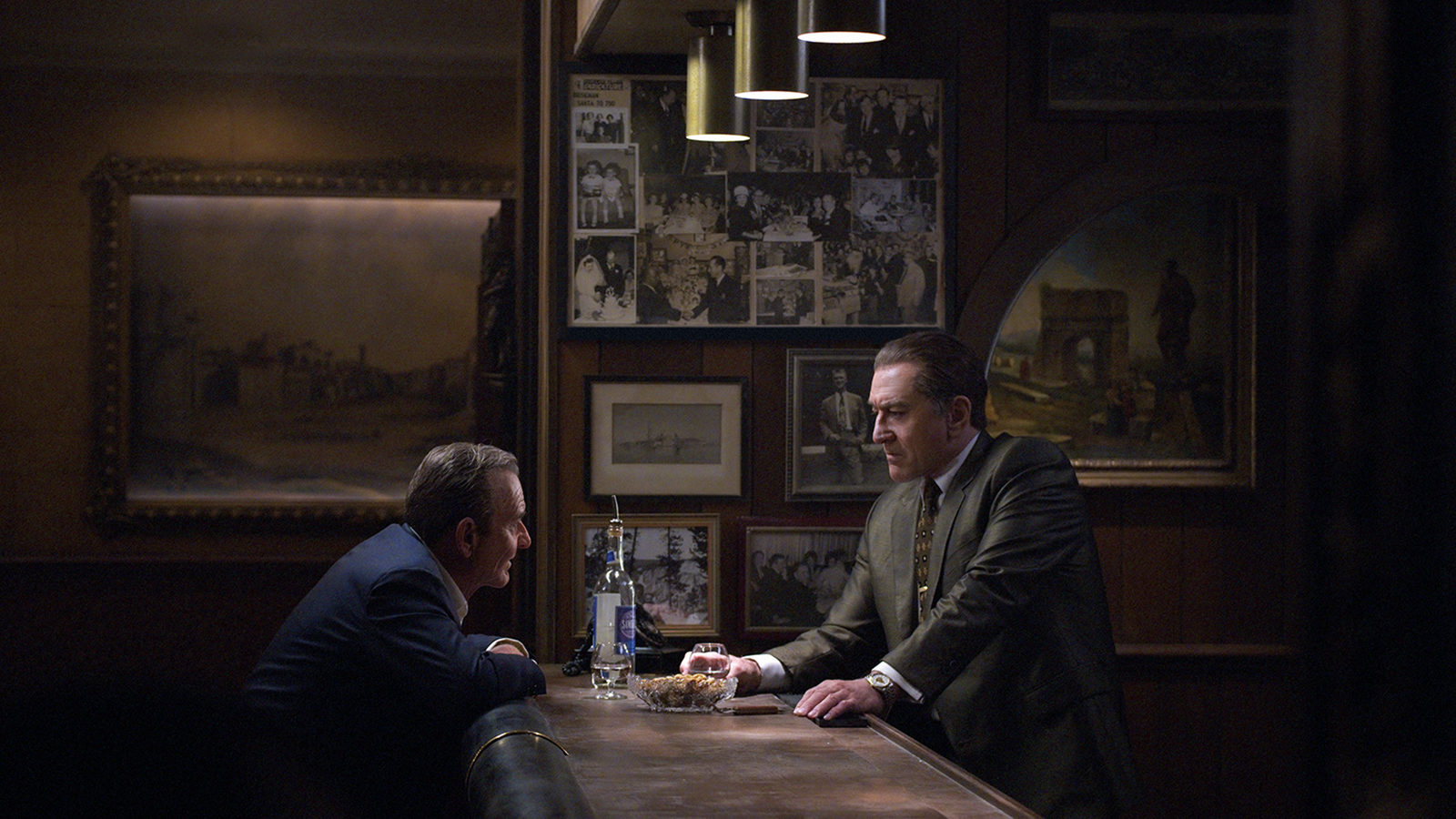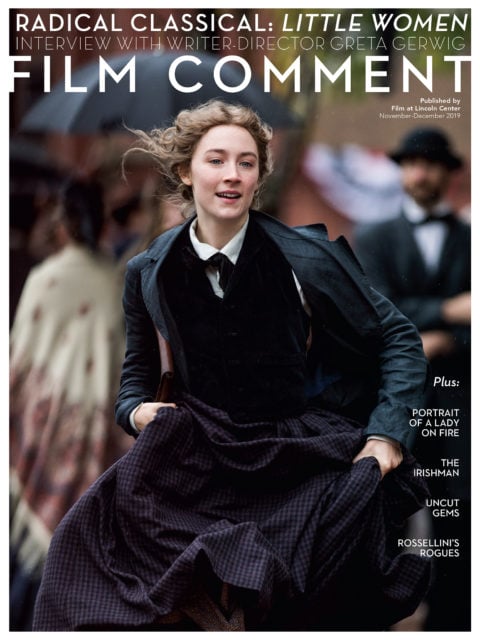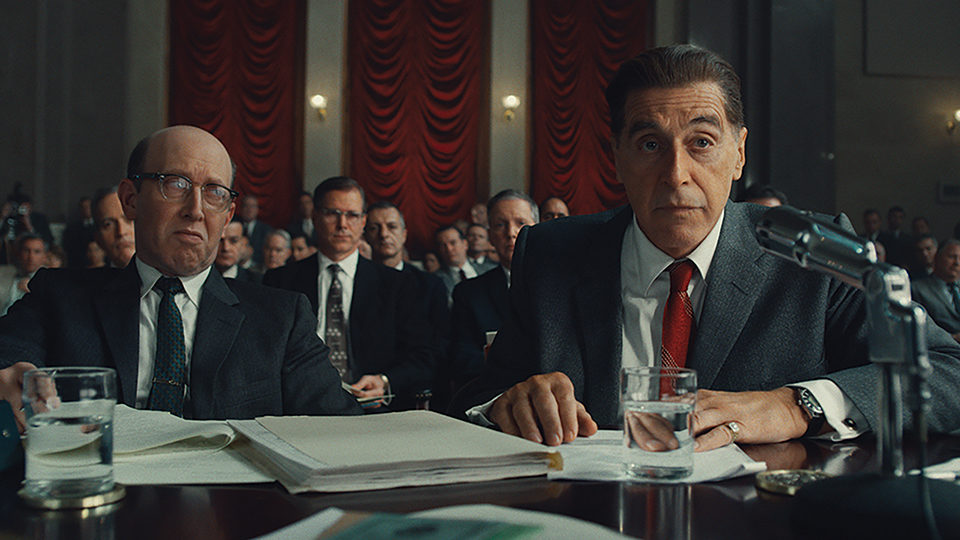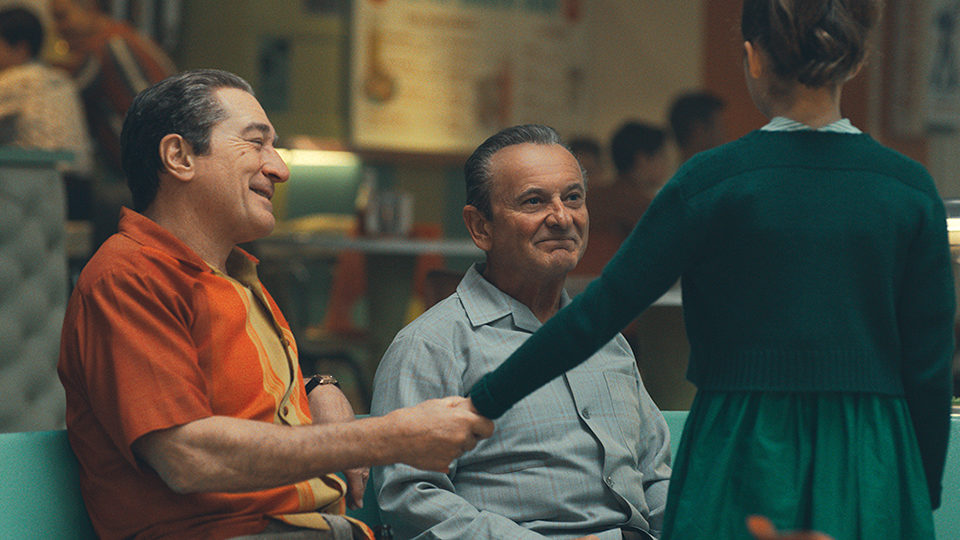
Death Be Not Proud
The backbeat to Martin Scorsese’s The Irishman is a lulling road trip, taken by Frank Sheeran (Robert De Niro) with his boss Russell Bufalino (Joe Pesci) and their wives, sometime in 1975. They’re headed to a family wedding, but there will be business to attend to, ugly business, even if their chitchat and carping could be heard in any of a million such cars where grandpa rules apply (here, no smoking) and rest stops are legion.

Framing the trip, and narrating Frank’s rise as a mercenary for the mob and a right-hand man to Jimmy Hoffa (Al Pacino with chummy showmanship), is… Frank, aged and wheelchair-bound in an old folks’ home, geriatrically affable, speaking as if from beyond the grave, or at least beyond the graves of all those he has outlived (or bumped off). But amidst the film’s camaraderie and beatdowns and killings and comical misunderstandings and bits of mafia business, the rhythm of the road—solidified in the toggling title credit (I HEARD/road/YOU/road/PAINT HOUSES)—keeps returning, later getting a fatalistic sonic counterpart in the score’s dirty-bluesy drum scarified by an ever-deepening cello, like scraping the bottom of life.
Frank’s biography traces a variation on a respected 20th-century arc of achievement: GI serving in World War II, truck driver working his way up, leadership role in the Teamsters, proud father to a family of five, and pillar of a community. Drawn from Charles Brandt’s I Heard You Paint Houses, Scorsese’s vividly illustrated, largely anecdotal 209-minute movie has a way of ably simulating the actual passage of any life, in skipping nimbly from station to station in Frank’s, usually through the encounters and relationships that comprise his profession: cruising through the years yet nearing twilight before you know it, and recalled equally in landmark events and episodes from the routine that fills the workday.
His routine is, initially, to do small favors for Bufalino (first met by chance at a truck stop), until the favors—the jobs—entail carrying out hits on marked men: the traitorous, the indebted, the threatening, and the otherwise inconvenient. These kills are depicted with an efficiency, an abruptness, shots fired at close range and often mid-stride, without any sadistic-seductive buildup nor what-have-I-done forced contemplation in the camerawork or staging. It’d probably feel more chilling if Scorsese lingered on the doorways where these shootings tend to occur, but the movie keeps driving on. Stopping us short—as we glimpse Frank’s family growing up, with a new wife entering the picture—is the periodic stare from one of his daughters: first as a solemn child, later as a teen (Anna Paquin), bearing witness to the brutality that she senses early on underwrites their stability. For most of the film, Frank’s “secret” life of crime is otherwise a joke we too are in on, with his friends and accomplices, rather than a shocking spectacle.
It’s a violent landscape that has become the terrain of modern myth, thanks to Scorsese, Coppola, and let’s not forget David Chase, who with The Sopranos re-psychologized the patriarchal burdens of mafia clan leaders, their experience of sins and redemption made dramatically more potent by the life-and-death stakes. In The Irishman, Scorsese determinedly sticks by his workingman protagonist: a soldier, not a boss, called upon to act and not considered fair game, as he serves two friends, Bufalino and Hoffa, in an arrangement that bestows order upon his world (and, in historical overlaps with Hoffa and JFK, much of the world anyone in the film knows) until it doesn’t. You might even feel a little sorry for the awkwardness that this all-consuming job creates with his daughter, though she seems to stand in as a kind of phantom conscience more than her own self. As he humbly, loyally serves, Frank puts his faith in a system that seems like it will last indefinitely and that reminds him of the Army: “You do what you’re told. You get rewarded.”
Still and all, what he does, and what he gets rewarded for, is killing people. And after a while, even within the coded confines of their criminal underworld—the term itself sounds too exotic for the company-like clockwork enforcement of protection kickbacks, investment rackets, deal fixing, and so on—I began to wonder what all this death means. To a certain extent, there’s pure pathos as Frank clearly journeys toward a fate of being forced to destroy that which is closest to him; The Sopranos just as devastatingly followed this tunnel to a vanishing point over several years on TV, but there is something about The Irishman that remains less encumbered by family concerns, so often an overcompensating refrain in mob films, not to mention the remove we’re sometimes placed at from Frank’s victims.

Al Pacino as Jimmy Hoffa in The Irishman (Martin Scorsese, 2019)
“He’s not a psychopath,” Martin Scorcese said of his protagonist, in response to a question at the first press screening for The Irishman in September. It was a strange thing to hear on the morning of its world premiere in the New York Film Festival, and for a second, I thought of ex-killer Tom Stall (Viggo Mortensen) in A History of Violence (2005) caught out for being “so good at killing.” In the Cronenberg film, Tom’s unexpected heroism becomes a tale of the return of the repressed, but Frank isn’t returning—he never left. We watch three-plus hours of him continuing on the same career track, as it were, business as usual, culminating in a hit whose logic is inescapable according to the laws of the jungle, or at least as we have come to understand them through the mob movie genre.
Told of Scorsese’s comment, one critic made a revision: Frank is not psychopathic, but sociopathic. Whichever the case, one might ask how unusual Frank in The Irishman is meant to be. Oddly enough, people in recent years have been spending quite a bit of their spare time watching killers, and in situations outside the usual context of law enforcement. Watching or rewatching assorted acclaimed TV series, I couldn’t help noticing how many zero in on people for whom killing is routine: The Sopranos, The Americans, Barry, Mindhunter, Killing Eve, Dexter. (There’s also the apocalyptic strand in which almost everyone has already died, like The Leftovers, or everyone is dead, like The Good Place, or in the niche case of Russian Doll, one person keeps dying.) Very often these shows return to the hollowing-out that is felt through the destruction of human life and through the maintenance of the double life required to insulate that pursuit. Mindhunter thematizes the very process of interpreting repeated murders, and its second season opener features a psychology professor counseling an FBI agent recovering from a breakdown: “When we empathize with a psychopath, we actually negate the self.” The friendly advice hit home, after gawping at all these people who were so good at killing, whether in The Irishman or elsewhere; maybe there was a reason that a feeling of emptiness could accompany the addictive frissons of these series.
Adapted from the book by John Douglas of the Behavioral Science Unit in the FBI—a pioneer of serial killer studies—Mindhunter seeks to dramatize and historicize the investigation of certain homicidal compulsions. In staging its detectives’ nature/nurture dialogues and case studies, the show ends up tracing the contours of deviance and norms in society, quite apart from the clear-cut extremity of murder (much less serial murder). And at the risk of making a category error, while watching The Irishman I began to feel that Frank’s effortless compartmentalization—bread-winner father and remorseless killer-on-command—had more in common with the psychopathologies of Taxi Driver or The King of Comedy than the mafia studies of Goodfellas or Casino. Had my eyes lost their place in reading the codes of crime genres, or was Frank—as vastly entertaining as the movie’s tough-guys-saying-stupid-shit patter and sveltely staged encounters could get—kind of just creepy in the actual substance of his existence? As ever, De Niro makes Scorsese’s portraiture possible here, with the fuggeddaboutit delivery and, at 76, bluff good looks. (Mindhunter does a bit of this too, casting the boyishly handsome Jonathan Groff as Agent Holden, a wide-eyed-curious undergrad presence diverging from most police procedurals.) But Frank’s workmanlike confidence fails him at his hardest moment, on a phone call to the woman whose husband he has murdered: like a repeated audio sample of a gasping fish, Frank nearly grinds to a halt with glottal stammers, speaking platitudes he knows to be false.
That astonishing moment comes late in the movie, and haunts the character to the end of his days in conference with a priest. But did I feel much sympathy for Frank, when it was also exactly the moment to which his blind loyalty to a seductive but fundamentally ruthless and terrifying hierarchy would inevitably lead him? Scorsese underlines that inevitability by introducing virtually every other mafioso or associate with on-screen text describing their year and cause of death (mostly premature and violent; the audience typically laughs in one case where it’s not). Those text cards forestall against glamorizing the power or savvy of the figures we see; for all their pull on earth, they all went to the same place. But for the deaths inflicted directly by Frank, the valence of each murder seems to be just as much metaphorical as literal: each stands in for a sacrifice, a tough decision, the bearing of responsibility on behalf of someone else or something greater—in some nagging sense, more fictive than felt.

Robert DeNiro and Joe Pesci in The Irishman (Martin Scorsese, 2019)
At the end of a lifetime of taking care of somebody else’s business, Frank is left infirm in a nursing home. This is no spoiler, because that’s how the movie’s frame opens, with Rodrigo Prieto’s camera roving down a hallway, past other elderly residents and a religious statue, resting on our source for the war stories to come. Or more properly, postwar stories, as Frank follows the progress of the World War II veteran down a path of achievement followed by disappointment. His partnership with Jimmy Hoffa and subsequent betrayal seems to twin with the decline of unions in the 20th century. (Is it too much to be reminded of Fredric Jameson’s sweeping declaration of The Godfather’s mob as an allegory of all-consuming, unforgiving, norm-breaking capitalism?) As Scorsese expertly orchestrates and compresses these eras, The Irishman acts as a kind of summa of his previous films’ chronicle of slices of American history, entwining business, culture, and the family.
At this point there has to be admitted a certain amusing insistence on owning this history, in the CGI technique referred to as “de-aging” and used to deploy the same actors across decades of events. It’s a technical and dramatic feat that on a certain level can’t help coming across as one generation simply and absolutely refusing to let go. De Niro’s rosy complexion as a truck driver “kid” recalls a tinted postcard photo more than a twentysomething person, and I can’t explain away the same de-aged De Niro curb-stomping a grocer, looking more like the septuagenarian star he is than a ferociously protective thirtysomething dad. That said, it’s an apt filter for Frank’s point of view, his memories of himself populated with variations on himself as an adult.
The anxiety over age powers part of the plot, as Hoffa feels aggravated and threatened by a young mob boss called Tony Provenzano (Stephen Graham) as well as a slippery yes-man in the Teamsters. With “Tony Pro,” it’s as if another mafia movie intersects momentarily with this one, with a more familiar energy. But it’s Pacino and De Niro’s portrayal of camaraderie, and Pesci and De Niro’s same rapport, that provide the emotional core of the film, for all the temptations of the genre to spin out of control. The Hoffa-Frank hotel suite chats, with Hoffa gabbing away confidences to his Number Two just before bed, are unexpectedly tender and true. And few scenes have the power of the tough love shown simply by Pesci’s look at De Niro when his side gig to bomb a laundry factory is discovered by capo Angelo Bruno (Harvey Keitel). These are the bonds that Frank recalls with the most feeling, but at what cost? Frank’s three-plus hours of chronicles do not immortalize in the manner of a “mafia epic,” but somewhere along the line, the choice of a hit man as a protagonist begins to feel like a form of artistic leverage.
“But you don’t feel anything at all?” a priest asks Frank near the end of his life, and processing a life, processing his life, I myself confess to wondering the same afterward. If I was worn out along with Frank at the end of his saga, is that the earned effect of his road to nowhere? Or have I been down this lost highway and dark alley too many times before, and gotten too good at watching killing, and wearied? Already The Irishman for me is becoming one of the stranger Scorseses, its pulse clear and vibrant while it is screening, only to be replaced by a feeling of stillness in retrospect. Maybe after all these years (mine and Frank’s), I feel a limitation to the use of murder in crime dramas as signifier, or maybe it’s just the fear of death talking. Or maybe, to quote Bufalino in very different circumstances, regarding a colleague who’d pushed things too far, it is what it is.
Nicolas Rapold is the editor-in-chief of Film Comment and hosts The Film Comment Podcast.







